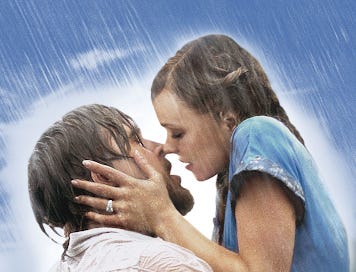Episode 11: The Notebook (2004)
How does family disapproval affect the course of love? Can volatile relationships flourish? Does love cure dementia? Paul and Eli consider these questions, and more, in their analysis of “The Notebook,” the 2004 romantic melodrama starring Rachel McAdams and Ryan Gosling—and the winner of the MTV Movie Award for Best Kiss.
(Quick housekeeping note: As we begin Season 2 of the show, we’re switching to an ever-other-Monday release schedule. Plus, we have some surprise guests in store!)
Subscribe at Apple, Spotify, or Episodes.fm
Hosted, produced, and edited by Paul Eastwick and Eli Finkel
Intro
1:00: (Eli) Who are the characters and couples?
2:50: (Paul) 1-minute plot recap
4:05: What is our relationship to this movie?
What the movie gets right
5:40: (Eli) Vulnerability and intimacy escalation
Emotional risk regulation review by Dr. Murray
7:55: (Paul) The stress of deciding between two potential romantic partners
Feelings toward a current and an ex-partner study by Dr. Spielmann
11:00: (Eli) In some relationships, the parts of ourselves we love the most can flicker out
The Michelangelo effect review by Dr. Rusbult
12:45: (Paul) Social network support and relationship success
Relationships are embedded in broader social systems review by Dr. Bronfenbrenner
Predictors of romantic breakup meta-analysis by Dr. Le
Social network support and relationship success by Dr. Sprecher
Correcting the “Romeo and Juliet effect” paper by Dr. Sinclair
People make a deliberate effort to integrate a romantic partner into their social network study by Dr. Stafford
16:00: (Eli) The power of co-creating the relationship microculture
Couple-defining songs study by Dr. Harris
17:10: (Paul) The experience of losing one’s virginity can be awkward
Age of first sexual experience study by Dr. Walsh
Misconceptions in the movie
18:20: (Paul) This movie grossly mischaracterizes how dementia actually works
The nature of aging-related dementia review by Dr. Waldron
21:15: (Eli) Heartbreak typically doesn’t last forever
People typically overestimate how much breakup will hurt study by Paul
The normative breakup-recovery sequence, according to attachment theory by Dr. Davis
Getting into a new relationship predicts breakup recovery study by Dr. Spielmann
24:40: (Paul) Volatile conflict tends to undermine relationships
Volatility during conflict is linked to lower relationship quality study by Dr. Holman
29:40: (Paul) In the 1940s (more than today), a man was unlikely to sacrifice for his female partner’s career
Highly educated women marry less educated men nowadays study by Dr. De Hauw
“Are we ok with this?”
31:50: (Paul) The whole “I’ll kill myself if you don’t go out with me” (whiny masculinity) shtick is harmful
34:30: (Paul) Romantic relationships don’t need to last forever to qualify as a success
37:30: (Eli) It’s jarring to witness a depiction of the 1940s racial hierarchy
38:45: (Eli) What are our ethical responsibilities to a partner is far more in love with us than we are with them?
Relationship Quotes!
40:20: (Paul) Partners find a way to perceive themselves as similar, even in extreme cases
41:35: (Eli) When love = home
43:00: (Paul) The importance of touch, laughter, and play in relationship success
What do we wish we knew?
44:15: (Paul) How do people make decisions when they have deep feelings for two potential partners?
45:30: (Eli) How do cross-class relationships function (e.g., one wealthy partner and one poor partner)?
46:35: (Paul) When do we regret foregoing a romantic relationship?
Overestimating foregone alternatives leads to regret study by Dr. Feiler
Stars (1–5): Both hosts rate the quality of the movie
Rusbults (1–5): Both hosts rate the accuracy of the movie’s ideas about relationships
Music by Andrew Fraker and Sons
Artwork by Katie Keil





